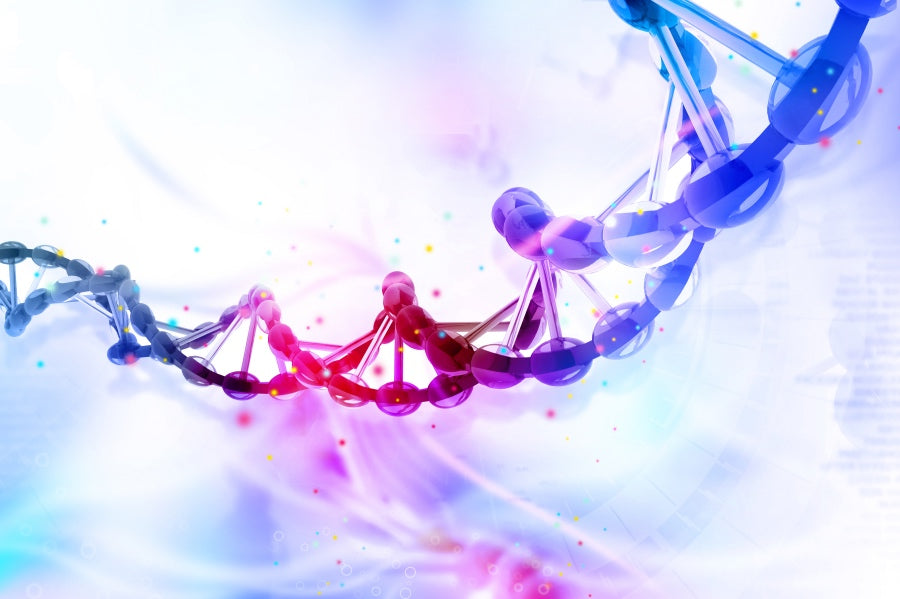
Key Roles and Healthy Sources of Amino Acids
Protein is an essential nutrient found in food. When you eat foods with protein, your gut breaks it down into tiny pieces. And these tiny pieces of protein are called amino acids. They’re essentially the smallest unit of protein. And the role of amino acids should not be underestimated!
What are the key roles of amino acids?
Amino acids are used to build new proteins. Essentially, your body reassembles them into larger molecules according to the code stored within your DNA. And many of these proteins then provide structure to your cells, tissues, organs, muscles, skin, and hair. Without them, you would simply be a blob. Seriously! But amino acids are also precursors to enzymes.
This means without amino acids, no metabolic reactions would occur. And by metabolic reactions I’m talking about making energy and burning fat among many others. In addition, amino acids are precursors to neurotransmitters. So without amino acids, there’d be no chemical signals to regulate your appetite, mood, sleep, and heart rate to name a few.
Further, proteins are necessary for the production of antibodies–vital components of your immune system. Amino acids can also have an anti-inflammatory effect as well as prevent oxidative stress, which leads to premature aging. I hope you get the point. Amino acids are one of the major components of human life. Without them, we wouldn’t exist. And we need a sufficient amount not only to survive, but to thrive.
What amino acids must be in your diet?
There are many amino acids. But generally about 19 to 22 that are commonly discussed. Some within this bunch are some that are considered to be “essential” amino acids. This means your body cannot make them and you must get the amino acids from food.
What are the “essential” amino acids?
- Lysine
- Leucine
- Valine
- Threonine
- Tryptophan
- Isoleucine
- Phenylalanine
- Methionine
- Histidine
Your body can synthesize the remaining amino acids. However, some are often referred to as “conditionally essential.” Meaning that in some circumstances your body may not be able to make sufficient quantities. Especially when the body is stressed in one way or another, which is sadly all too common in our fast-paced world with our Standard American Diet (a.k.a. processed food diet).
What are the conditionally essential amino acids?
- Proline
- Glycine
- Glutamine
- Tyrosine
- Arginine
- Cysteine
What are the non-essential amino acids?
- Serine
- Glutamic acid
- Asparagine
- Alanine
- Aspartic acid
Sources of essential amino acids in food
Proteins that your body breaks down into amino acids are found in both plant and animal foods. In general, animal foods are considered “complete” proteins because they contain all essential amino acids. Animal foods are the best sources of essential amino acids. And plant proteins are often referred to as “incomplete” because they are missing an essential amino acid or two. Plant proteins are found in nuts, seeds, legumes (beans and lentils), and whole grains (i.e., oats and quinoa).
Healthy sources of animal proteins include wild fish and pasture-raised meat and poultry. Bone broth and collagen protein powder are also two excellent sources of amino acids. Especially because the proteins are already broken down into smaller pieces, which makes it easier to digest.
It’s also worth noting that bone broth and collagen powders are especially rich in glycine and proline–two of the conditionally essential amino acids. This is important for several reasons. First, most people eat mostly muscle meat, which is a low source of these conditionally essential amino acids. So supplementing your diet with bone broth and collagen protein is a great way to ensure you get a good variety of all the sources of amino acids your body needs. Second, glycine and proline are great for healing your gut. And third, because glycine and proline are the key building blocks of collagen, using them as a source of amino acids helps your body strengthen and build new collagen. This means healthier joints, firmer skin, and stronger hair and nails. Yes, please!
Protein digestion as a source of amino acids
There are many factors at play when it comes to digesting protein and successfully breaking it down into a source of amino acids for your body. And a lot rides on the health of your gut. This means if your gut is sick, it might be difficult for your body to fully digest protein and give your body the amino acids it needs. In this case, it’s best to eat proteins that are already partially broken down such as those found in slow cooked meats, bone broth, and collagen protein powders.
Soups, stews, and smoothies with healthy proteins are also good choices to use as a source of amino acids. In addition, it’s always important to thoroughly chew your food. First, it’s easier for your body to digest smaller pieces of food than larger chunks. Second, the process of chewing gets your digestive juices flowing. This includes your stomach acid, which is absolutely necessary for protein digestion. Ironically, many people take antacids to reduce the production of stomach acid in an effort to treat heartburn and reflux. But in most cases, the problem isn’t high amounts of stomach acid.
Usually, the level of stomach acid is too low. And in this state, foods can be difficult to digest. They then sit in your stomach too long and travel back up the pipe. This means taking antacids may be just adding fuel to the fire and could potentially lead to amino acid deficiencies.
How to use supplements as a source of amino acids?
There’s a lot of buzz about using supplements as a source of amino acids. Some argue that taking them before or after a workout helps build more muscle. This may be true, but this is not without risks. Plus, if you’re eating a whole foods diet (such as my 21-Day Bone Broth Diet or 10-Day Belly Slimdown), that should be the main source of amino acids your body needs. Especially because both of these plans focus on nutrient rich foods as well as help you heal your gut and lose weight simultaneously. In general, I don’t recommend using supplements as a source of individual amino acids. There may be a time and place for this, but if so, I believe it should be done with the help of a professional. Otherwise, you may cause more harm than good as well as waste a bunch of money.
Why are amino acids so important?
Amino acids are a slice of life. They’re necessary for almost every structure and function within your body. And eating healthy, clean sources of protein regularly should supply you with all the amino acids you need. But keep in mind your body also needs an abundance of other nutrients. Including many that work synergistically with amino acids. So don’t skimp on the colorful fruits and veggies and healthy fats. Keep it real and balanced!
Keep thinking Big and living BOLD!









